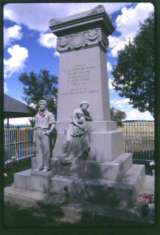

In Colorado the Industrial Workers of the World have a rich history. The most notable activity was conducting the coal strike of 1927 which resulted in the Columbine Massacre. If you haven't yet read this dramatic history, click on the IWW prose link.
Colorado historical societies, labor unions and community organizations commemorated the sacrifice of coal miners in a week of ceremonies in 1989. The Colorado Labor Advocate covered the events. There was also extensive national coverage inspired by the scattering of Joe Hill's ashes at the ceremony.
I recited the Columbine Mine Massacre poem at the unveiling of the State of Colorado Highway Marker commemorating the massacre.
I lived next to an old coalminer for a decade. His life inspired Coalminer's Widow.
Columbine Coal Miner resulted from trying to imagine the personal aspects of the massacre.
Wobblies were also present at the Ludlow Massacre in southern Colorado, when coalminers went out on strike under the banner of the United Mine Workers. Helen and Gust of Ludlow is a poem about the long-lasting impact of that strike.
The poem Helen and Gust of Ludlow
Wobblies have often paid a high price for their beliefs and activities. Frank Little was dragged out of bed and hung from a railroad trestle for opposing World War I. Others have been shot, beaten, harrassed, jailed on vagrancy charges.

Conversation With the Goons
They saw my card and taunted me--
"
An 'I won't Work' and 'Red'".
But what I answered got their goat
And filled them full of dread.
"Freedom, solidarity--
That's what the card stands for.
The red is for the workers slain
In every capital war.
"I won't work on atom bombs,
Won't tear the forests down.
I will not dump your toxic waste,
Nor spread your poisons 'round.
"I will not ship your war machines
For use against the poor.
I'll stand with other workers and
We'll have no more of war.
"But I Will Work for workers' rights,
I'll work for liberty,
I'll work for safety on the job,
I'll set the workers free."
They took my card and tore it up.
They beat me 'til I bled.
They justified their brutal deed--
"
You're dangerous" they said.
They've bruised me. And they've knocked me down.
They've mocked me with a grin.
They've laughed, but I'll be laughing last
'Cause one day I Will Win.
--rm

Set It Right was once called "Thousand Points of Light". I wrote it during the first Bush administration. Seems things have gone downhill considerably since then. Do you suppose that Enron had anything to do with that?
I spent thirty-two years working in a factory. That experience immensely enriched my working class values. I offer a few short factory poems to commemorate the experience.
One of the favorite characters from early twentieth century class-conscious cartooning was Mr. Block. Seems this fellow just couldn't accept or understand that he was a worker, not a member of the boss class.
I've written a couple of Mr. Block poems. Perhaps you've met someone like him.
My early knowledge of labor unions was mostly negative. I learned about the Haymarket "riot" in school. As a teen i read about the evil of unions in Reader's Digest. It wasn't until i started checking independent sources that i discovered how slanted is the history that we teach our children.
I wrote a poem in 1986 to commemorate the real Haymarket story. It is pretty dry, not an inspired work, but it is about a time and event that has tremendous historic significance.
Speaking of historic significance, i am proud to have been acquainted with one of the most sincere and honorable of activist-artists, someone with a long history of accomplishment in the field of art-with-a-cause, the late Carlos Cortez.
The MUSIC of the I.W.W. is as rich as the poetry. Here are some off-site links to Wobbly and other union music. Also see the music section on the links page (menu below).
Here are the lyrics of the Solidarity Singers.
I've created a list of working class videos on this site.
And here is Blue Collar Review, a website for working class poetry.
Industrial Workers of the World Poetry





















